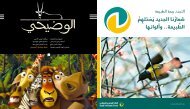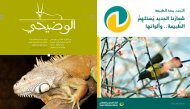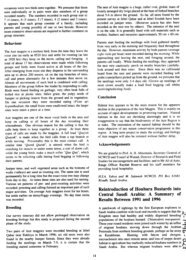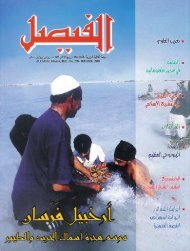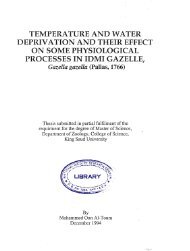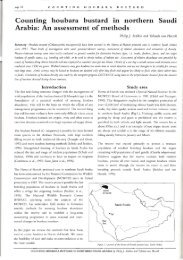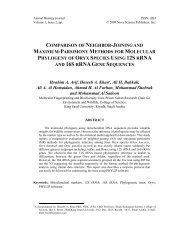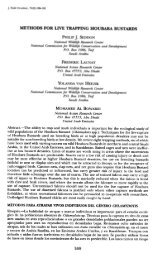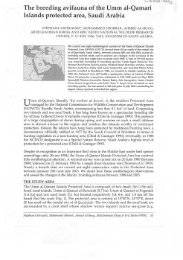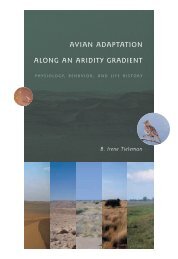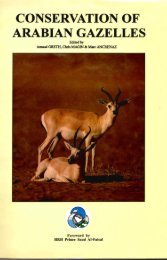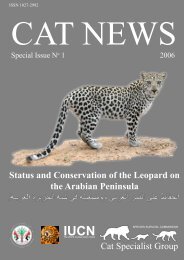The Unfenced Desert Towards a strategy for eco ... - Nwrc.gov.sa
The Unfenced Desert Towards a strategy for eco ... - Nwrc.gov.sa
The Unfenced Desert Towards a strategy for eco ... - Nwrc.gov.sa
You also want an ePaper? Increase the reach of your titles
YUMPU automatically turns print PDFs into web optimized ePapers that Google loves.
departments of Planning and Protected Areas, Research and Studies, and Monitoring,<br />
with input from research staff of the King Khaled Wildlife Research Center and the<br />
World Conservation Union (IUCN) adviser. At this meeting draft guidelines <strong>for</strong> <strong>eco</strong>tourism<br />
were distributed <strong>for</strong> discussion. <strong>The</strong> results of these discussions are summarised<br />
below. Meeting minutes were drawn up and distributed to group members <strong>for</strong> further<br />
input, and a report was presented to the NCWCD Secretary General.<br />
Summary of discussions<br />
General tourism issues; scale and scope of tourism in wildlife protected areas<br />
<strong>The</strong> group endorsed the need <strong>for</strong> the NCWCD to guide the national development of<br />
tourism through adoption of minimum impact guidelines and setting examples of best<br />
practise. However, there was some concern over whether wildlife protected areas, chosen<br />
to protect key species and their habitats, were appropriate locations <strong>for</strong> the development<br />
of tourism.<br />
It was suggested that it was important that the NCWCD “have a <strong>sa</strong>y from the start” over<br />
how natural resources are exploited by the tourism industry, and that while one focus of<br />
the NCWCD would be on protected areas, these represented only one point on a<br />
spectrum of natural resource uses. <strong>The</strong> point was made that <strong>eco</strong>-tourism is often<br />
characterised by low visitor numbers and as such could be appropriate <strong>for</strong> protected<br />
areas, whereas larger scale nature-based tourism could and should be developed by the<br />
NCWCD through wildlife parks, particularly in order to educate the wider public on<br />
environmental issues.<br />
<strong>The</strong>re was discussion concerning whether small tourist groups could generate sufficient<br />
revenue and other benefits, particularly <strong>for</strong> local communities. <strong>The</strong>re would be scope <strong>for</strong><br />
the development by local communities of subsidiary attractions, but the very real<br />
problem of social and cultural impacts would remain.<br />
<strong>The</strong> need <strong>for</strong> the NCWCD to gain experience in developing and implementing tourism<br />
projects was stressed by the group. This may include examination of existing successful<br />
nature-based tour operators, e.g. Golden Eagle Travel (brochures provided to the group<br />
by Mr Ady), and especially training. Dr Seddon advised the group that the USA-based<br />
Eco-tourism Society (TES) runs training workshops on <strong>eco</strong>-tourism project<br />
development.<br />
International tourism development in Saudi Arabia.<br />
Recently the Saudi Government has opened the way <strong>for</strong> limited, regulated international<br />
tourism through sponsor companies. <strong>The</strong> group considered this to present an<br />
83




